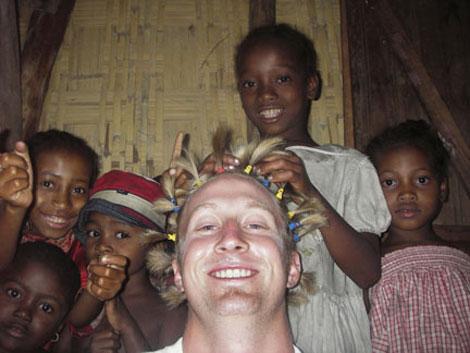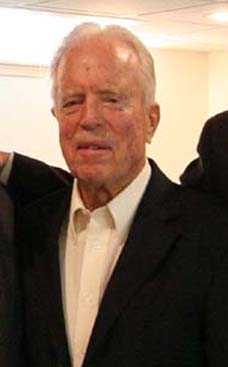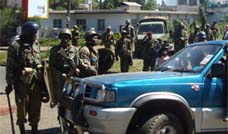
Hervol spent three months training for the experience. He spoke little of the language, Malagasy, when he arrived (now he's fluent). Volunteers are placed in villages with the mission of finding their own work and projects. A house was provided, but the rest was left up to him. "It can be easy to get overwhelmed. You're in this foreign place, you don't speak the language and you have to find your own work on top of it," Hervol said. "Sometimes the most difficult thing is the isolation -- from your own culture, but also in communication," he added. "You can't tell people how you feel. If you're mad at someone you can yell at them in English, but they don't understand. You can't even say how or why you feel it. That was tough." He spent time working in the local clinic and on other projects in the village. At the clinic, he would work with the doctors, nurses and the residents to teach about HIV and AIDS, birth control and vaccination. He would also assist with work in the clinic.
Danny Hervo just returned home to Hungry Horse after two years in Madagascar working as a Peace Corps volunteer
Montana to Madagascar
Posted: Thursday, Jan 10, 2008 - 10:13:17 am MST
Caption: Danny Hervol recently returned from working as a volunteer in the Peace Corps in Madagascar. Here he's shown with his "normal crew of kids" after putting his hair in tiny tails, which he said hurt dearly to take out. - Submitted photo
Hungry Horse man talks of life in an island country (and why he's going back)
By HEIDI DESCH - Hungry Horse News
The highs were very high, but the lows were very low.
But mostly the time Danny Hervol spent in Madagascar was an experience like no other.
Hervol, 25, just returned home to Hungry Horse after two years in Madagascar working as a Peace Corps volunteer. Over that time, he periodically submitted e-mail updates to the Hungry Horse News.
"You're either very high or very low -- sometimes you feel on top of the world," he said of the experience. "It made me stronger. It was a personal test."
He finished his stint in the Corps, but does plan to return to Madagascar this month in hopes of working there.
Madagascar is an island nation off the east coast of Africa. It's the world's fourth largest island and has a population of about 16 million.
Hervol graduated from Columbia Falls High School in 2001 and then attended Puget Sound University in Washington where he earned a bachelor's in psychology.
At first, he wasn't very interested in serving in the Peace Corps.
But the offer to defer his student loans for a few years and see the world was very appealing. Hervol had studied abroad in college in Australia and visited Costa Rica, but he wanted more.
"I'm not one of those 'save the world' kind of guys," he said.
As it turned out that lack of optimism may be one of the best assets he had going into the experience.
"The less expectations you have you can't be disappointed," he said. "In a country like that you better plan on (your goals) to fail."
The Peace Corps is an independent U.S. federal agency that sends volunteers around the world to work in areas of education and health.
Hervol spent three months training for the experience. He spoke little of the language, Malagasy, when he arrived (now he's fluent). Volunteers are placed in villages with the mission of finding their own work and projects.
A house was provided, but the rest was left up to him.
"It can be easy to get overwhelmed. You're in this foreign place, you don't speak the language and you have to find your own work on top of it," Hervol said.
"Sometimes the most difficult thing is the isolation -- from your own culture, but also in communication," he added. "You can't tell people how you feel. If you're mad at someone you can yell at them in English, but they don't understand. You can't even say how or why you feel it. That was tough."
He spent time working in the local clinic and on other projects in the village.
At the clinic, he would work with the doctors, nurses and the residents to teach about HIV and AIDS, birth control and vaccination. He would also assist with work in the clinic.
He worked on an expansion of a local school and also constructing a food market building.
At the time he left, the market was not completed. He was able to finish the concrete floor for the building, but not the roof.
"The hardest thing is that you're not there for you, you're there for them," Hervol said. "You work your tail off, but you don't get results."
The bottom line, he said, "You can't make the people do what they don't want to do."
The largest challenge he faced was the lack of enthusiasm from the people. Often the Malagasy people were busy working their rice fields and so couldn't help with the project.
Also, he noted, the people have a different concept of time than to what people in the United States are accustomed.
For example, he said there just accomplishing one task in a day, such as opening a bank account, is considered a successful day.
Hervol said he does plan to visit the village again after returning, with the hope being that it will inspire the people there to finish the project.
All of his work was done while adapting to life in a very different place than the one in which he had grown up.
The weather was quite different. There was an array of bugs he'd never encountered before. There was always the possibility of contracting a disease. He often faced discrimination.
Hervol said during the summer it was so hot and humid that he would be sweating the minute he got finished showering using buckets of water.
The heat would cause everything to shut down from noon until 2 p.m. On rainy days, he wouldn't leave his house because it was raining so hard.
The insects were rather intimidating until he became more accustomed to them. Checking his food, clothes and bedding for insects became a way of life.
"(While at home here) I opened a box of crackers and looked inside first," he said. "I've gotten used to checking my food to make sure there's not something in it before I eat it."
Large spiders that weren't harmful would often come into his house or millipedes that were much more dangerous.
When he first arrived, he said he would often go to bed at 5:30 or 6 p.m. when it got dark because he felt safer once in his bed with its mosquito netting.
Disease was also a threat.
"They have a lot of diseases that we don't have a defense to because they aren't in this country," he said.
The Peace Corps gives volunteers numerous vaccinations to prevent against disease and are also given check-ups while they are still working in the field.
Hervol tested positive for having been exposed to tuberculosis while during a check-up. He spent eight months on preventative medicine to ward against actually getting the disease.
Malaria was a large threat. He still will have six months after leaving Madagascar before he would know if he's contracted it. He's also on medication to prevent getting malaria.
He said because the Peace Corps does a good job monitoring the health of its volunteers he wasn't really concerned with contracting diseases.
At times, Hervol said, the discrimination he faced really messed with his mind.
Being Caucasian was often positively or negatively discriminated against. Madagascar's population is made up of Austronesian origin, and African in the area where Hervol lived.
"You might be told, 'Oh, you're white, come here and sit at the front in a meeting.' Or told 'to get the hell out of here,'" he said. "You never know what to expect. It was unsettling."
Not all of his experiences were bad.
"People are people anywhere you are. If you try to show an interest in their culture they appreciate that," he said. "You can learn more about your own culture from the outside looking in than you can understand while living in it."
With all of the challenges he faced, Hervol still wants to return to Madagascar.
He will head back this month. He's interviewed for a job, but doesn't know for certain whether he'll be hired.
But he said even if it means knocking on doors he'll find a job.
Why go back to a place where he faced so much?
"The people are much happier there. They enjoy life. It's not just work, work, work," he said.









